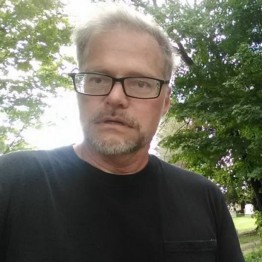By James Finn | DETROIT – What would you do as a parent if your comfortable home and middle-class lifestyle were killing your kid?
Pack up whatever possessions you could fit in your car? Drive 1,300 miles over four anxiety-filled days, spending almost your last penny to get your son to safety? I can hear parents everywhere shouting, “Of course! That’s what parents do!”
When I lived in Germany, I met parents who fled conflict zones and impoverished themselves to give their kids a shot at safety and happiness. I never dreamed I would meet fellow Americans who chose to become refugees right here in the U.S.
Then two nights ago, I spend two hours on the phone with “Kate” and “Kody,” who just fled Florida for a New York homeless shelter.
53-year-old Kate tells me she had no choice. It was either leave Florida or watch her 16-year-old transgender son wither and possibly die.
She had good reason to fear.
Years ago, she spent a month sleeping on a sofa in the living room with Kody. He was only 13, he’d tried to overdose, and even though he said he was fine, she wouldn’t let him out of her sight.
Everything got better for a while. Kody made friends with other trans kids, he started puberty blockers, he felt good about himself, and life seemed okay. Kate let her guard down, and then … all hell broke loose.
This is Kody’s story. And Kate’s.
Kody tells me on the phone that he first realized he was trans when he was 7. I’ve only emailed the family up to now, and I’m interested to note that Kody sounds like a typical 14 or 15-year-old boy. His voice is reedy and rough — not yet a man’s but no longer a boy’s. He’s sharp. Talkative. Well informed. If I didn’t already know he was 16, I might have guessed 17 or 18.
He and Kate are on speakerphone with me, and he tells me he didn’t have a label for transgender at 7, but he knew. When he was 8, he told Kate.
Kate says her first instinct was denial.
“I went through all the stages-of-grief process, including fear and terror, in about 15 minutes. He was just looking at me, and I didn’t say anything. Then I said to myself, ‘Shit, this isn’t about me.’ I thought about how scared he must be about all the things he would have to face.”
Kody tells me, “My mom’s support and her open mindedness was pretty quick. The next day she was like, ‘What do you need me to do, and what do we do next?’”
He didn’t come out to anybody else for years, but he was a stubborn little boy. He couldn’t bring himself to wear a uniform skirt to school. “The staff was adamant, but I refused. They finally stopped trying to make me. Otherwise, I flew under the radar.”
Then as puberty started, Kody started to spiral. Kate says she’d been worried, knowing the changes would be traumatizing. One day when Kody was about 11, he walked into the bathroom to take a shower and noticed his shoulder-length hair in the mirror.
“I had started puberty early, and did not want to be viewed as a girl. It hit me like a ton of bricks, and I was like, ‘That has to go!’ I took my grade-school baby scissors and chopped it all off.”
Kate laughs a little, remembering how crazy Kody’s hair looked. Then she says, “When you came out of that bathroom, it completely broke my heart.”
She took him to a barber, got him a buzz cut he loved, and that began his difficult public coming-out process.
“Mom knew how serious things were getting. I was beginning to lose friends, so she researched community support. She eventually found a program called Compass.”
Compass is an LGBTQ community center in Palm Beach County that offers a peer-support group for youth. Kody started attending and making friends when he was 12.
“That’s when my social transition got more pronounced. I had my name picked out, and I was sort of telling teachers as I went along. Then I came out to my dad. He was often busy at work and was not as present as average, but we had a decent relationship.
“One morning when he got up about 6:30, I asked him if he could talk to me for a second. He was in my room beside my bed. I took my blanket and threw it over my head so I couldn’t look at him. I blurted really quickly, ‘I think I might be trans.’ And he was like, ‘Oh, that’s it?’ I took the blanket off, and he said, ‘That’s OK.’”
Kody’s dad did not reject or mistreat him, but he remained in Kody’s words, “not present.”
Despite family and peer support, Kody spiraled further.
“I had just gotten into 7th grade at a new [public] school and it was the worst school year of my life. I was getting bullied a lot. I was extremely depressed and started seeing a psychiatrist and taking anti-depression medication. It wasn’t working. I was still bullied and severely depressed. Staff were not queer friendly. There was only one other trans student at school.”
Students and staff constantly bullied Kody and the other trans kid. “The guidance counselor told both of us separately that Jesus would save us [from being trans]. She said we still have time and we don’t understand what we’re feeling, but Jesus does.”
Kody tells me with a mixture of amusement and anger that the other kid is Jewish. Kate was incensed, but there wasn’t much she could do. Besides, she had her hands full.
Kody began to have “meltdowns.” He says, “When mom got me up for school, I would scream, cry, kick, whatever.”
One day on the way to school, “Mom handed me the bottle of antidepressants and I stared for about 30 seconds. Then I opened it to take my medicine, and in one swell swoop I took all of them.”
I’m not expecting Kody to say this, so I’m shocked into silence. When I catch my breath, I say, “You were only 13. Did you take those pills to send a message or did you really intend to die?”
Kody voice goes whisper quiet. “I really wanted to die.”
He moves on fast. “Mom immediately pulled over to a gas station, called dad and asked him what to do. I tried to throw up and did a little. It was mostly regret but also because I didn’t like the way my mom felt.”
Kody was hospitalized for quite a while, although the medications he took aren’t lethal even at high doses. Doctors worried he’d try again, and when he finally came home, Kate went into hyper-protective mom mode, not letting him out of her sight even to sleep.
Kate realized something had to change fast.
She reached out to Compass Center staff, and they got her a list of six local doctors who do gender therapy. She found one who took their insurance and who eventually prescribed puberty blockers to ease Kody’s traumatizing dysphoria. She panicked over the impossible $4,000.00 annual price tag. Then she qualified for a financial aid program, and Kody received his first of four quarterly injections to put his sexual maturation on hold.
“Did that help?” I ask.
His tone says, ‘Not really.’
“By the time I started them, I was well into being 14. They stopped my cycle, which was the worst part. They slowed breast growth but didn’t reverse existing growth.”
He took the shots for about a year, then on his doctor’s advice, he started testosterone. For almost another year, things started looking up.
That’s when the “hell” I mentioned broke loose.
The State of Florida passed the so-called “Don’t Say Gay” law, which filled local news with angry voices of conservative parents hating on trans students and calling their parents groomers and pedophiles. Kody watched carefully as the Texas governor announced child-abuse investigations of parents with transgender children.
When the governor of Florida suggested he’d do the same thing, Kody felt guilt that he might hurt his parents and intense fear that he’d be taken from them. His grades suffered and so did his mental health.
Kate says, “I became terrified of child abuse investigations and Kody being put in foster care. He could not survive in the system. This was a matter of life or death.”
Then as if things weren’t bad enough, Kody’s doctor moved away.
Kate went back to Compass for a referral, but their list of 6 doctors willing to treat trans kids had shrunk to one, and when Kate called up, that practice didn’t take her insurance.
Kody was forced to stop testosterone cold turkey, and his mental health took a nosedive.
Together, mom and son decided they absolutely had to get out of Florida. They planned it for months.
New York was Kody’s idea.
Trans teens he talked to there told him they felt safe and supported at school instead of bullied. He needed that! Kate saved every dime she could, and in a leap of desperate faith, packed the car up at the beginning of September and started driving her son toward hope. She tells me she didn’t have concrete plans, that she struggled with extreme anxiety for the four days the trip took.
I ask her what the final straw was. “What got you in that car?”
Her voice shakes. “My son lost another one of his peers.”
I don’t know what that means, so Kody spells it out. “I had a trans friend I’d known for years and got the news he committed suicide.”
Kate says, “That for me was it!” She became convinced that getting Kody to New York was a matter of saving his life. Nothing would stop her, not even anxiety.
Things are finally looking up.
I first learned about this when Kate emailed me from New York several days ago. She wrote to thank me for my recent article about the Rainbow Youth Project, which provides crisis support for LGBTQ kids. She wrote that she was reaching out to them and felt really hopeful and — finally — not alone.
I immediately contacted Rainbow Youth and after a couple days learned they were working to arrange medical care. Kody is assigned to a case manager now, and from what I know of the organization, they’ll do whatever it takes to get him the care he needs.
By the end of the call, Kody’s voice sounds more than reedy and rough. It sounds happy. Full of hope.
He describes the tiny, kitchen-less room they’re sleeping in as clean and private — as if living in a homeless shelter is the least of his worries. He’s excited about school, which he says he loves. He’s making friends. His teachers are calling him by his chosen name using he/him pronouns. All he had to do was ask!
In Florida, he says, “It’s like pulling teeth.”
About New York, he adds, “I am incredibly optimistic. Obviously, we face a lot of hardships getting into stable living, but I no longer have this looming dread waking up in the morning.”
Kody and Kate are going to be okay, but the desperate situation they found themselves in is shared by far too many LGBTQ families in the U.S.
Many parents of transgender kids in conservative states are scared to death about abuse investigations and lack of health care. Rainbow Youth case managers tell me Kody’s lack of access to a doctor is becoming normal in some red states, particularly Florida and Texas.
In Texas, child abuse investigations have been stopped by the courts, allowed again, and stopped again in some cases. Parents have no idea what to expect.
This summer, the outspoken transgender girl Kai Shappley, who has testified multiple times before the Texas Legislature to advocate for transgender youth, announced a fundraiser so she and her family could flee Texas.
Kai and Kody are tips of the iceberg. I hear from LGBTQ families constantly about the danger they feel they’re in — about how becoming refugees in their own country feels like their only option to stay healthy and stay together.
Do you want to help?
Get out and vote this November. Send a message to Republican leaders that picking on LGBTQ families for political gain is a losing tactic. Do you want to help families more directly? Give generously to local and national LGBTQ organizations that provide direct services.
Read about the Rainbow Youth Project USA here, or click the graphic below to learn how you can help by volunteering time or funds.
Do you know LGBTQ families in need? Do you feel helpless or hopeless? Rainbow Youth volunteers are ready to help. Right now.

************************

James Finn is a columnist for the LA Blade, a former Air Force intelligence analyst, an alumnus of Queer Nation and Act Up NY, and an “agented” but unpublished novelist. Send questions, comments, and story ideas to [email protected]
********************
The preceding article was previously published by Prism & Pen– Amplifying LGBTQ voices through the art of storytelling and is republished by permission.








